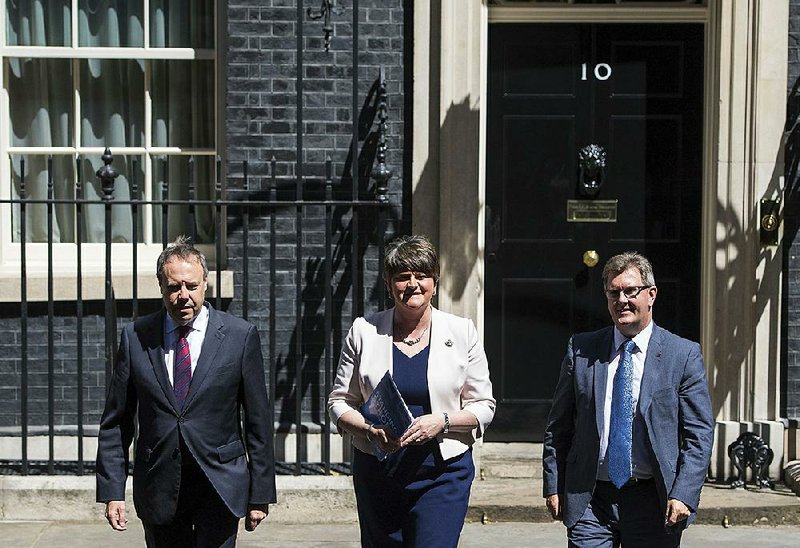LONDON -- The United Kingdom's Conservatives signed a deal Monday with Northern Ireland's Democratic Unionist Party that will allow Prime Minister Theresa May to govern after losing her majority in a general election this month.
The deal, which is reported to provide Northern Ireland with additional funding of about $2 billion over five years, will enable May to win a clear majority vote in Parliament on Wednesday on the legislative program her government set out last week. Without the support of the Democratic Unionists, May risked losing that vote of confidence, which would have opened the way for the opposition Labor Party to try to form a minority government of its own.
The Northern Irish party, socially conservative and largely Protestant, has 10 members of Parliament. After nearly two weeks of negotiation, mostly about money for the province, its leader, Arlene Foster, agreed to what is known as a "confidence and supply" agreement with May. The documents were signed in Downing Street by lesser figures.
May was quoted by Britain's Press Association as saying that the pact was a "very, very good one" and that the two parties "share many values," including "the desire to ensure a strong government, able to put through its program and provide for issues like the Brexit negotiations," a reference to the British exit from the European Union. Foster said she was "delighted that we have reached this agreement, which I think works, obviously, for national stability."
The smaller party will support the Conservatives in crucial votes that could bring down the government and on "legislation relating to Brexit and national security," May said. Its support is not guaranteed on other legislation. But the two parties agree on most things, including the U.K.'s exit from the EU, and the Democratic Unionists are particularly eager to keep Labor Party leader Jeremy Corbyn from being prime minister, given his past sympathies for the Irish Catholic Sinn Fein party and the Irish Republican Army.
May called a snap election June 8 to bolster her authority in Parliament in preparation for the EU exit, but her campaign faltered and she lost her majority. With the support of the Democratic Unionists, she will now have an effective working majority in the 650-seat House of Commons of 13 -- given that Sinn Fein does not take up the seven seats it won and the speaker of the House and his two deputies do not vote.
The terms of the agreement are still vague, beyond the extra funding for the province over the five-year term of the Parliament, if it lasts that long.
Such deals with smaller parties, which are short of a formal coalition, have proved fragile in the past.
There is continuing speculation that the Conservatives may choose to replace May as prime minister as early as October; no senior Conservative has publicly suggested that the party wants to fight another election with her as leader.
Some Conservatives, like John Major, the former prime minister, had urged May to manage a minority government without the Democratic Unionists. Their fear was that a formal deal would violate the British government's vow of neutrality in Northern Ireland, where the Democratic Unionists and Sinn Fein are at odds over continuing a power-sharing agreement.
Opposition Liberal Democrats said the pact was "shoddy" and joined other opposition parties in calling for its details to be publicized. Labor's deputy leader, John McDonnell, said: "Let's call this grubby deal what it is: this is a straightforward political bribe to desperately prop up Theresa May in office."
May also gave more details Monday of the U.K.'s offer to secure the rights of more than 3 million citizens of other EU countries after the U.K. withdrawal as she seeks to gain reciprocal rights for some 1 million British citizens living in the bloc.
"We want you to stay," she said in Parliament. "I want to completely reassure people" that "no EU citizen currently in the U.K. lawfully will be asked to leave."
"No families will be split up," she said, adding that family dependents who move to Britain to join an EU citizen living there would be able to apply for "settled" status after five years.
That will be the term used for EU citizens who meet the five-year rule. May said they will be entitled to full U.K. health and pension benefits.
"After the U.K. has left the European Union, EU citizens with settled status will be able to bring family members from overseas on the same terms as British nationals," she said.
But she did not specify a cutoff date, saying it should be part of the negotiations with Brussels, which wants the cutoff to be when Britain formally leaves, March 29, 2019, and not before.
The two sides also disagree on what body should adjudicate disputes over citizen rights. Britain argues that after it leaves the bloc, British courts should rule for those living in Britain; the European Union wants the European Court of Justice to decide.
EU officials had said the proposals were a reasonable first step but fell short of expectations.
After Monday's announcement, the EU's chief exit negotiator, Michel Barnier, tweeted that there was still "more ambition, clarity and guarantees needed."
Information for this article was contributed by Steven Erlanger and Stephen Castle of The New York Times; and by staff members of The Associated Press.
A Section on 06/27/2017
